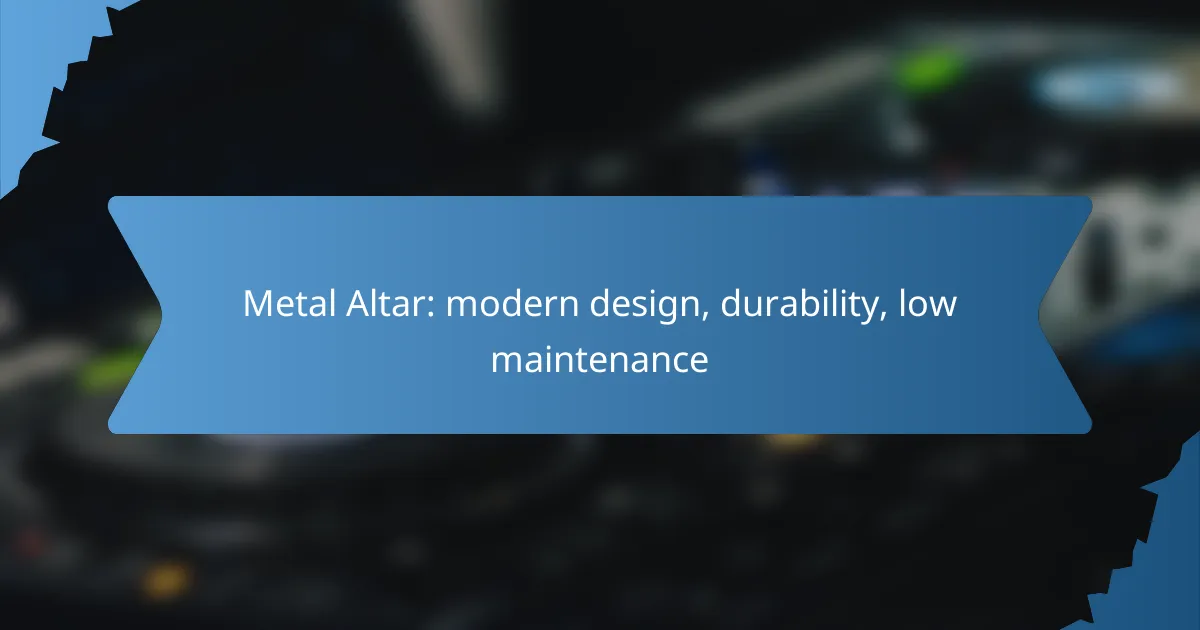A metal altar combines modern design with exceptional durability and low maintenance, making it a perfect choice for various settings. Its sleek appearance not only enhances the aesthetic appeal of any space but also ensures long-lasting use with minimal upkeep. When selecting a metal altar, consider factors such as size, design, and material quality to meet your specific needs.

What are the benefits of a metal altar?
A metal altar offers several advantages, including exceptional durability, minimal maintenance needs, and a sleek, modern design. These features make it an ideal choice for both indoor and outdoor settings, ensuring longevity and aesthetic appeal.
Durability in various weather conditions
Metal altars are built to withstand a range of weather conditions, from intense sunlight to heavy rain and snow. Materials such as stainless steel or aluminum resist rust and corrosion, making them suitable for outdoor use without significant degradation over time.
When selecting a metal altar, consider the specific climate of your area. For instance, coastal regions with salty air may require additional protective coatings to enhance longevity. Regular inspections can help identify any wear and tear early on.
Low maintenance requirements
One of the key benefits of a metal altar is its low maintenance needs. Unlike wooden altars that may require regular sealing or painting, metal versions typically only need occasional cleaning with mild soap and water to maintain their appearance.
To keep your metal altar in optimal condition, avoid using abrasive cleaners that could scratch the surface. A simple routine of wiping down the altar every few months can prevent dirt buildup and preserve its finish.
Modern aesthetic appeal
The sleek lines and contemporary materials of metal altars contribute to their modern aesthetic appeal. They can complement various architectural styles, making them versatile for different settings, from urban environments to natural landscapes.
When choosing a metal altar, consider its design elements, such as color and finish, to ensure it aligns with your overall decor. Options like brushed or polished finishes can enhance the altar’s visual impact, allowing it to serve as a striking focal point in any space.

How to choose the right metal altar for your needs?
Choosing the right metal altar involves considering your specific requirements, including size, design, and material quality. Prioritize these factors to ensure the altar meets your functional and aesthetic needs.
Consider size and space availability
When selecting a metal altar, first measure the available space to determine the appropriate size. Ensure there is enough room for both the altar and any accompanying items, such as candles or decorations.
A general guideline is to allow at least 3 feet of clearance around the altar for easy access and movement. This will help create a comfortable environment for rituals or ceremonies.
Evaluate design options and styles
Metal altars come in various designs and styles, from minimalist to ornate. Consider the overall aesthetic of your space and choose a design that complements it.
Popular styles include contemporary, industrial, and traditional. Look for features such as intricate engravings or sleek finishes that align with your personal taste and the intended use of the altar.
Assess material quality and finish
The durability of a metal altar largely depends on the quality of materials used. Look for altars made from high-grade metals like stainless steel or aluminum, which resist corrosion and wear.
Additionally, consider the finish of the altar. A powder-coated finish can provide extra protection against scratches and fading, ensuring the altar maintains its appearance over time.

Where to buy metal altars in the United States?
You can purchase metal altars in the United States from various sources, including local garden supply stores, online retailers, and specialty metalwork shops. Each option offers unique advantages in terms of selection, price, and convenience.
Local garden supply stores
Local garden supply stores often carry a selection of metal altars suitable for outdoor use. These stores typically offer products that are designed to withstand the elements, ensuring durability and longevity.
When shopping at a garden supply store, consider visiting during the spring or summer months when inventory is likely to be at its peak. Check for seasonal sales or promotions that may provide additional savings.
Online retailers like Wayfair
Online retailers such as Wayfair provide a vast array of metal altars, allowing you to compare styles, prices, and customer reviews from the comfort of your home. This option is particularly convenient for finding unique designs that may not be available locally.
When purchasing online, pay attention to shipping costs and delivery times, as these can vary significantly. Look for retailers that offer free shipping or easy return policies to ensure a satisfactory shopping experience.
Specialty metalwork shops
Specialty metalwork shops often create custom metal altars, allowing you to choose specific designs, sizes, and finishes. This option is ideal if you are looking for something unique or tailored to your specific needs.
When considering a specialty shop, ask about the materials used and the craftsmanship involved. Custom pieces may come at a higher price point, but the quality and personalization can be worth the investment.
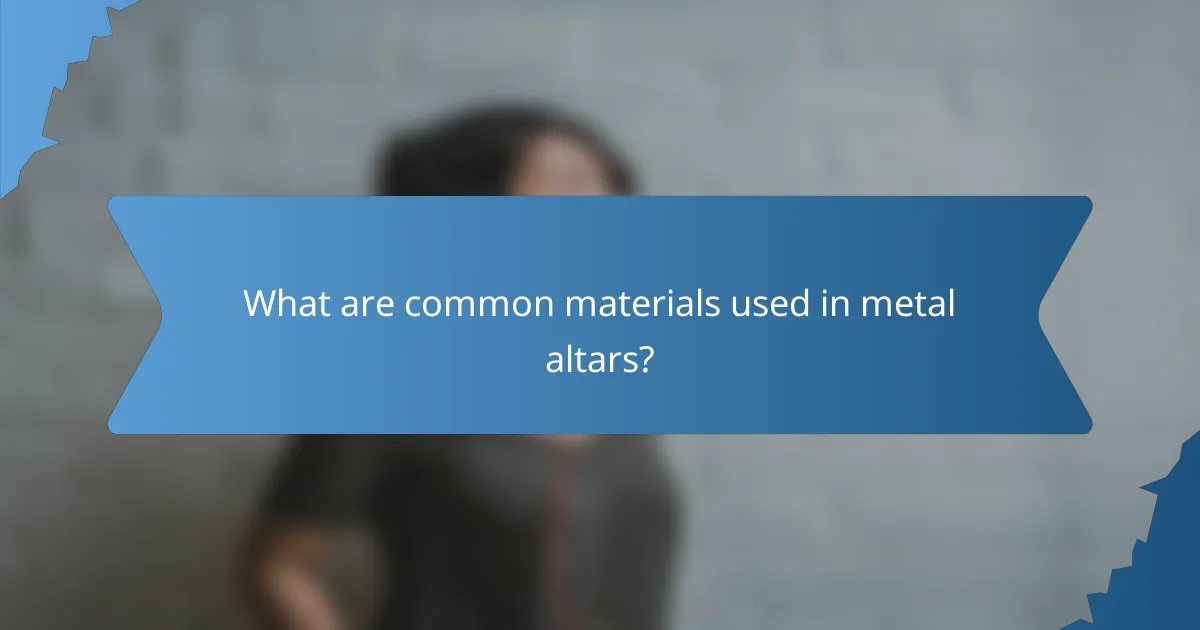
What are common materials used in metal altars?
Common materials for metal altars include stainless steel, aluminum, and wrought iron. Each material offers unique benefits in terms of durability, maintenance, and design aesthetics.
Stainless steel for corrosion resistance
Stainless steel is a popular choice for metal altars due to its excellent corrosion resistance. This material can withstand exposure to moisture and various environmental conditions, making it ideal for both indoor and outdoor settings.
When selecting stainless steel, look for grades like 304 or 316, which provide enhanced durability. Regular cleaning with mild detergents can help maintain its appearance and prevent tarnishing.
Aluminum for lightweight options
Aluminum is favored for its lightweight properties, making it easy to transport and install. This material is particularly useful for altars that may need to be moved frequently or set up in different locations.
While aluminum is not as strong as stainless steel, it is resistant to rust and can be treated with coatings for added protection. Consider anodized aluminum for improved durability and a sleek finish.
Wrought iron for traditional designs
Wrought iron is often chosen for its classic aesthetic and strength, making it suitable for traditional altar designs. This material can be intricately shaped and styled, offering a timeless look that complements various decor themes.
However, wrought iron requires more maintenance than stainless steel or aluminum, as it can rust if not properly coated or painted. Regular inspections and touch-ups can help preserve its beauty and structural integrity.
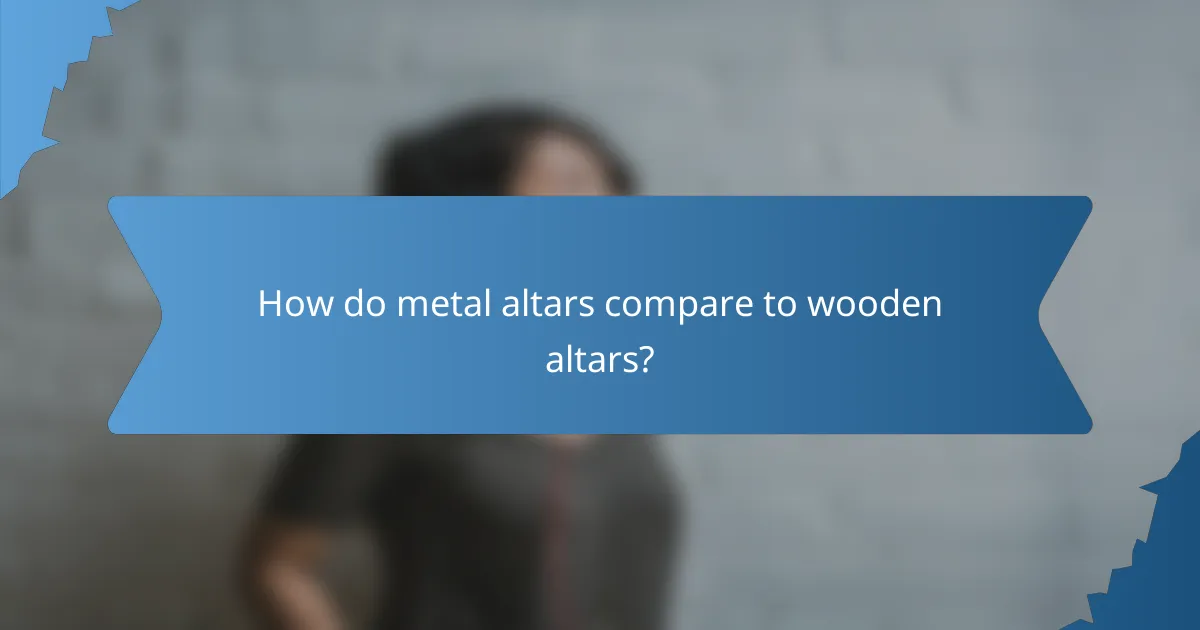
How do metal altars compare to wooden altars?
Metal altars generally offer greater durability and lower maintenance compared to wooden altars. While wooden altars can provide a traditional aesthetic, metal options are increasingly popular for their longevity and resilience against environmental factors.
Longer lifespan of metal altars
Metal altars can last several decades, often outlasting wooden alternatives by a significant margin. While wood may require replacement or extensive repairs every 10-20 years, metal structures can remain intact for 30 years or more with minimal upkeep.
The durability of metals like stainless steel or aluminum makes them resistant to corrosion and wear, ensuring they maintain their structural integrity over time. This longevity can be particularly beneficial for outdoor settings where exposure to the elements is a concern.
Less susceptibility to pests and rot
Metal altars are not vulnerable to pests such as termites or wood-boring insects, which can severely damage wooden altars. This resistance eliminates the need for chemical treatments or regular inspections for pest-related issues.
Additionally, metal does not rot or warp due to moisture, making it a reliable choice in humid or wet environments. This characteristic allows for consistent performance without the risk of deterioration that often affects wooden structures.
Different aesthetic choices
Metal altars come in a variety of designs, finishes, and colors, allowing for a modern aesthetic that can complement various settings. Options range from sleek, minimalist designs to intricate, decorative styles that can enhance the visual appeal of a space.
While wooden altars often convey a rustic or traditional look, metal alternatives can provide a contemporary feel. This versatility means that individuals can select an altar that aligns with their personal style and the overall ambiance of the location.
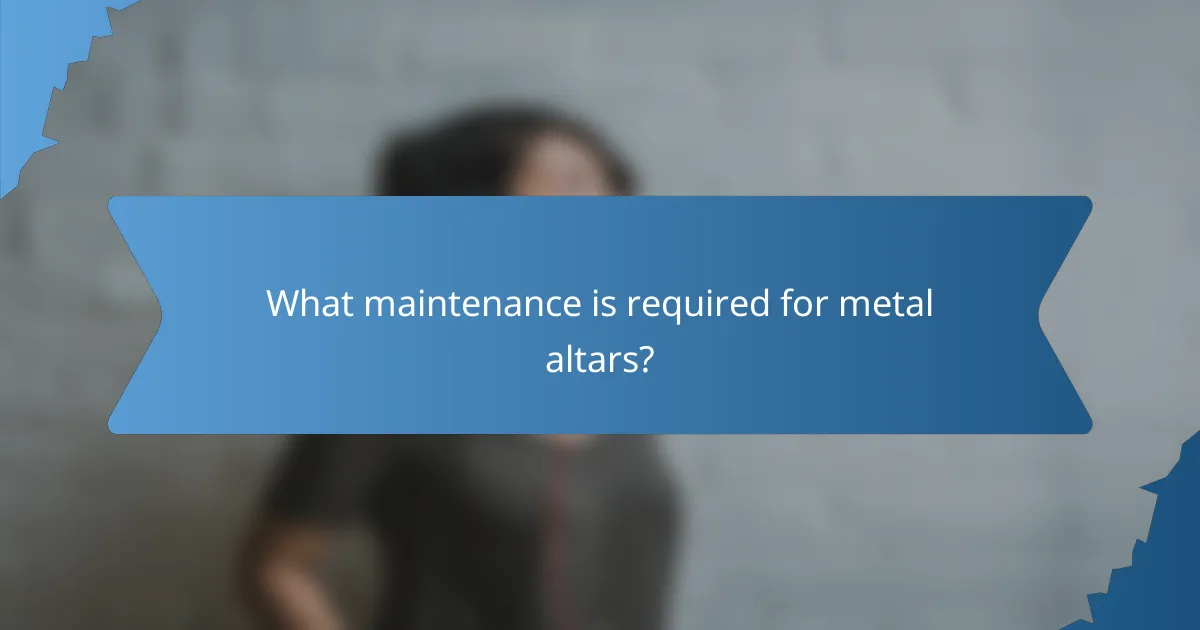
What maintenance is required for metal altars?
Metal altars require minimal maintenance, primarily focusing on regular cleaning and periodic inspections to ensure longevity and structural integrity. By maintaining these aspects, you can prevent issues such as rust and deterioration over time.
Regular cleaning to prevent rust
To prevent rust on metal altars, regular cleaning is essential. Use a mild detergent mixed with water to wipe down the surface, removing dirt and moisture that can lead to corrosion. Aim to clean the altar every few months, or more frequently in humid environments.
After cleaning, ensure the altar is thoroughly dried to minimize moisture retention. Applying a protective wax or sealant can also help shield the metal from the elements, extending its lifespan significantly.
Periodic inspections for structural integrity
Conducting periodic inspections is crucial for maintaining the structural integrity of metal altars. Check for any signs of rust, corrosion, or physical damage at least twice a year. Pay special attention to joints and welds, as these areas are more susceptible to wear.
If any issues are detected, address them promptly to prevent further deterioration. For example, small rust spots can be sanded down and treated with rust-inhibiting paint. Regular inspections help ensure that the altar remains safe and functional for years to come.
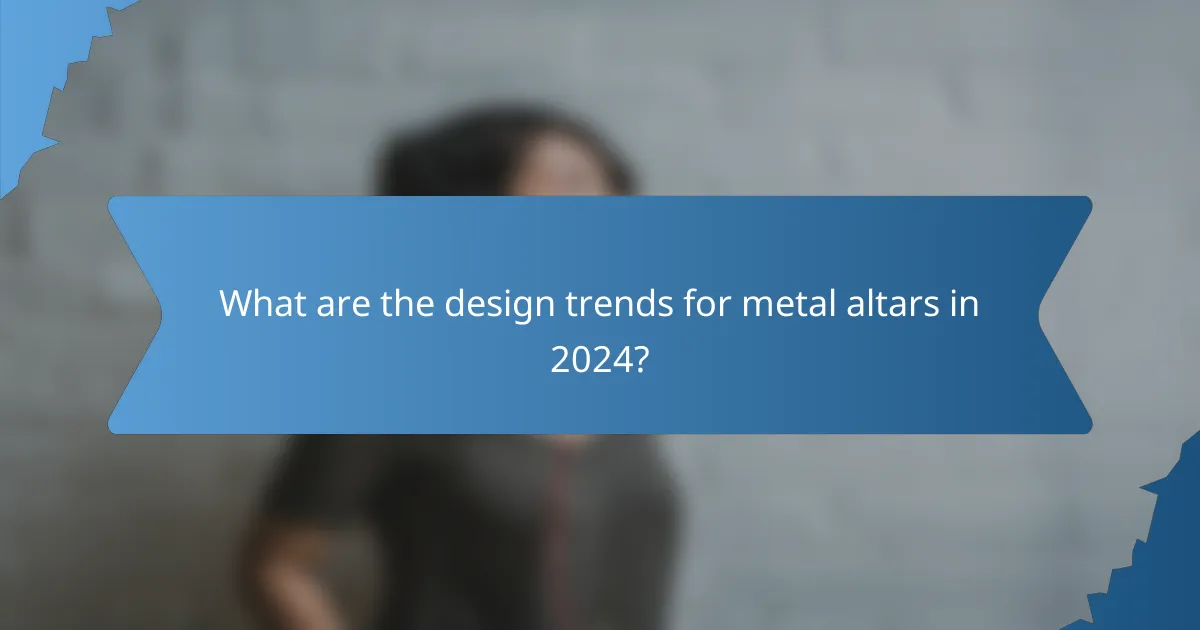
What are the design trends for metal altars in 2024?
In 2024, metal altars are trending towards sleek, minimalist designs that emphasize durability and low maintenance. These altars often incorporate modern aesthetics with functional features, making them suitable for various settings, from homes to public spaces.
Minimalist Aesthetics
Minimalist design is a key trend for metal altars, focusing on clean lines and simple forms. This approach not only enhances visual appeal but also allows the altar to blend seamlessly into different environments. For example, a matte black finish can create a striking contrast against natural wood elements.
Choosing a minimalist altar can reduce visual clutter, making it easier to focus on the ceremonial aspects. The use of geometric shapes and open spaces often characterizes these designs, offering a contemporary feel.
Durability and Materials
Durability is a primary consideration in the design of metal altars, with materials like stainless steel and aluminum being popular choices. These metals resist corrosion and wear, ensuring that the altar remains functional and visually appealing over time.
When selecting a metal altar, consider the environment where it will be placed. For outdoor use, look for weather-resistant finishes that can withstand various climates. Investing in high-quality materials can save costs on replacements and repairs in the long run.
Low Maintenance Features
Low maintenance is a significant advantage of modern metal altars. Many designs incorporate finishes that are easy to clean and resistant to stains, making upkeep straightforward. For instance, powder-coated surfaces can be wiped down with a damp cloth, requiring minimal effort to maintain their appearance.
Additionally, consider altars with integrated drainage systems or removable components that facilitate cleaning. This practicality is particularly beneficial in high-traffic areas or settings where the altar may be exposed to the elements.
